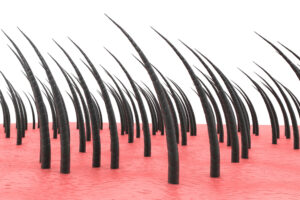The Link Between Weight Loss Surgery and Hair Loss
 We at Leonard Hair Transplant Associates are commonly asked if there is a link between weight loss surgery (bariatric surgery) and hair loss. There are a couple of reasons why we often see hair loss after this treatment for obesity.
We at Leonard Hair Transplant Associates are commonly asked if there is a link between weight loss surgery (bariatric surgery) and hair loss. There are a couple of reasons why we often see hair loss after this treatment for obesity.
First is that bariatric surgery is performed using different techniques that require general anesthesia. General anesthesia can, indeed, cause a physiologic hair loss called telogen effluvium. The second reason: these types of procedures can cause often dramatic decreases in caloric intake, leading to the desired rapid weight loss. Again, telogen effluvium can occur because of this situation.
This is a temporary, self-limiting shedding that will, in most cases, regrow. It takes a few months for the shedding to stop and another few-to-several months for the regrowth to occur. You must be very patient.
If, however, a person who already has known or not-yet-evident genetic hair loss undergoes bariatric surgery and experiences telogen effluvium, we commonly observe the regrowth is not to the full extent as the pre-surgical state. In other words, it doesn’t grow back as thick as it had been before the surgery.
What should be done in this case is to treat the signs of male or female pattern hair loss with the FDA approved and cleared therapies we offer to our patients every day: Auxo A300 laser therapy, Rogaine® Foam, and (when appropriate) Propecia®—all of which are important to stop the accelerated progression of hair loss. If the situation warrants it, hair transplantation may be an excellent option as well.
If you find yourself in this situation, please contact us and we shall be happy to help you!
Dr. Robert Leonard, Founder

